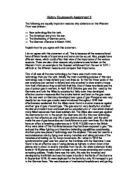History Coursework Assignment 3
The following are equally important reasons why stalemate on the Western Front was broken:-
- New technology like the tank.
- The American entry into the war.
- The blockading of German ports.
- The German offensive in March 1918.
Explain how far you agree with this statement.
I do not agree with this statement at all. This is because all the reasons listed have different levels of importance and none can be equal. Also, people have different views, which could affect their view of the importance of the various reasons. There are also other reasons why stalemate was broken on the Western Front; an example is the Russian withdrawal from the war in 1917. I will look at the different reasons and compare their importance.
First of all was all the new technology, but there was much more new technology than just the tank. Initially the main overriding purpose of this new technology was to help defend your own lines as for the first three years of the war everyone just wanted to defend and only attacked to draw enemy troops from their offences so they could hold their line. One of these new ideas was the use of poison gas in warfare. In April 1915 Chlorine gas was first used by the Germans and took the Allies by surprise but fairly soon they developed effective counter measures like the smoke helmet and later on the gas mask. As the war went on Germany developed new types of gas Phosgene was very deadly but as more gas masks were introduced throughout 1916 their effectiveness weakened. But the Allies never found a counter measure against another type of gas: mustard gas. This gas was not very deadly but attacked the skin and made it burn and swell and so wounded a lot of men which drained more Allied resources than dead soldiers did. The Allies also used gas against the Germans but not to the extent the Germans did. But this new technology was not that effective as only 3% of gas victims actually died and the wind made the use of gas hazardous as it could blow onto your own lines. But this did have an effect at breaking stalemate as in 1918 113,000 men in the British Army were taken off the frontlines because they had been exposed to gas. This reduced the Allies fighting and therefore defending capabilities considerably. Another quite new piece of technology was the airplane. This was first used in a reconnaissance role by flying over enemy trenches and taking pictures of the trenches and looking out for troop movements. But when in 1915 the synchronization gear was first used on the frontlines with the Germans it was found to be an effective way of using planes as fighters to shoot down other planes and to shoot at enemy trenches from the air. So when stalemate finally broke in 1918 planes were useful to keep up with troops advancing and to shoot retreating soldiers. Finally there was the tank, this was first invented and developed by the British and was first seen in battle in the Battle off the Somme in September 1916. 49 were deployed for the battle but only 18 managed to get to the German lines. This was because of mechanical breakdowns and getting stuck in the mud in no-mans land. But this was successful enough to make the Allied High command order 1000 more tanks. This highlights the problem with these early tanks, they were very unreliable. But if they did reach their destination they could wreck the enemies morale as well as shoot them down. The Germans did not think the tank was worth developing until Hitler came to power in Germany in 1933.







